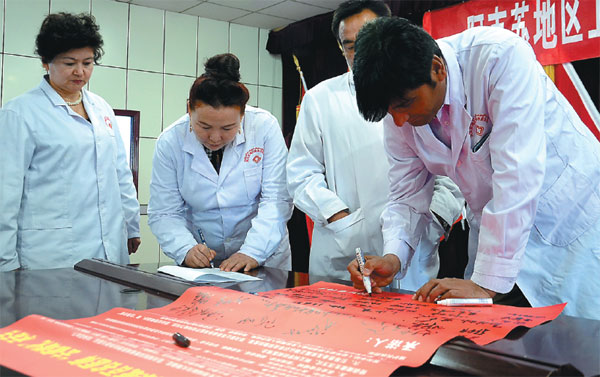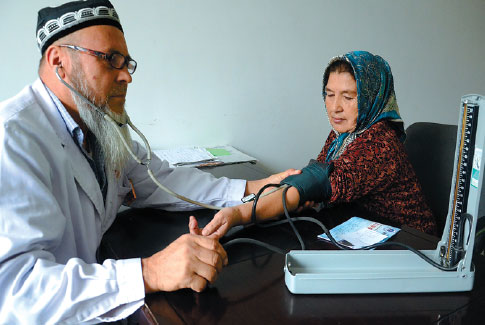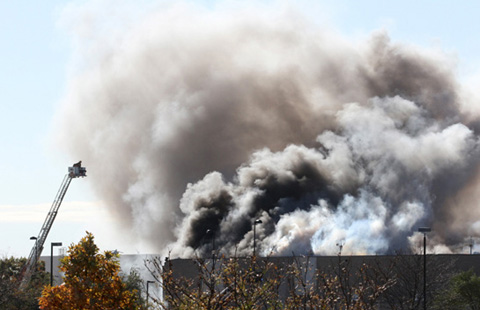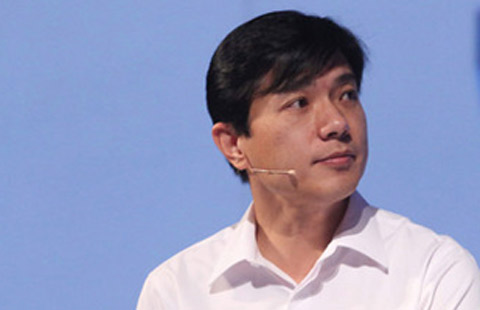The rise of intolerance
Updated: 2014-10-31 07:23
By Cui Jia and Gao Bo(China Daily USA)
|
||||||||
|
Medical staff in Aksu prefecture in the Xinjiang Uygur autonomous region sign their names on a paper of commitment to show their opposition to extremism. Gao Bo / China Daily |
|
A Uygur doctor examines a patient in a hospital in Aksu prefecture. Gao Bo / China Daily |
Extremists are threatening the traditional way of life of the Uygur ethnic group in China's western regions, report Cui Jia in Urumqi and Gao Bo in Aksu prefecture.
As he walked along the narrow corridors packed with patients, Amir Ali, a physician and director of the Aksu Hospital of Traditional Uygur Medicine, said he's noticed a marked change in the way the local women are dressing recently.
Aksu is a predominantly Muslim prefecture in the south of the Xinjiang Uygur autonomous region, and Amir said that in the past 12 months, an increasing number of female patients and visitors have arrived at the hospital wearing the niqab, the full-face black veil favored by ultraconservative Muslims, instead of their usual colorful headscarfs bearing traditional Uygur patterns.
Now Amir feels that a virus is spreading - not in people's bodies, but in their minds.
"The spread of religious extremism is like the Ebola breakout - it happens quickly and there is no effective cure once people have it," the 49-year-old said. "People's mindsets and lifestyles have changed because of it, but not in a good way."
Maierdan Muget, commissioner of Aksu prefecture, said people from the Uygur ethnic group account for about 80 percent of the local population, and most are Muslims. They have been targeted by separatists, religious extremists, and terrorists, who promote extreme views to encourage them to carry out jihad, or "holy war". They tell the people that religion is more important than anything else, including the law. "Their ultimate aim is to establish an Islamic caliphate by launching terrorist attacks. They want to drag society back to the Dark Ages," he said.
On February 14, a group of 12 men, on motorbikes and in cars, used homemade bombs to attack a police patrol in Aksu's Wushi county. Eight of the attackers, who were also armed with knives, were shot dead by the police, and three committed suicide by blowing themselves up. Two police officers were injured in the attack.
The police said the group was led by Mehmut Tohti, who first attracted attention about three years ago when he began spreading extreme religious views. He has been the leader of a 13-strong band of terrorist suspects since September 2013.
According to police reports, the group regularly listened to audio materials and watched videos related to terrorist activity, and undertook a program of physical training. They made the bombs and purchased the vehicles and long knives in January, and conducted a series of trial explosions to test their homemade devices in preparation for the attack.
"The Xinjiang people will never live in peace until religious extremism is eliminated," Maierdan said, adding that almost all the perpetrators of violent attacks in the region and other parts of China in recent years had been influenced by inflammatory material on the Internet and in books.
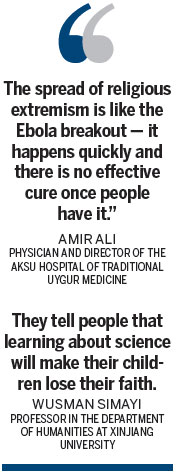
Brainwashing
According to Amir, the extremists also pose a danger to society in other, more-subtle ways: "Making women cover their faces is one thing, but what worries medical professionals like me is that they try to stop people from taking medication by telling them that the medicines are not halal."
He said that when medical teams visit villages to administer vaccine shots, some residents refuse the treatments because they have been told the vaccines are not halal, meaning Muslims are not allowed to take them. "We constantly have to explain the medicine behind the treatments and how vaccines can prevent fatal diseases. Sometimes it doesn't work, though, because some of the people have been completely brainwashed," he said.
Rozwangul Kebear, who has worked as a nurse at the hospital in Aksu for 18 years, said: "It's been noticeable in the past few years that an increasing number of people have refused to take pills because they believe they contain non-halal ingredients. I can tell that someone has said something to them. It's so sad to see people get sick because they won't take medication."
It took two years for Ayijiagul Wupper, a nurse in Aksu's Wensu county, to persuade a young man with diabetes to accept treatment. "The 25-year-old said he had been told the insulin shots are not halal and that people shouldn't seek treatment when they are sick because they have to accept their fate, which has been decreed by Allah," Ayijiagul said. "How evil people must be to tell others to just accept death when they are sick. "
Eventually, after a number of complications set in, the patient agreed to take the shots. "I am so pleased to see him getting better," Ayijiagul said.
Zhang Xuehui, director of the central hospital in Wensu's Jiamu township said: "Some extremists even stop us when we go to villages to give people oral polio vaccines. They tell the villagers that the vaccines contain contraceptives that will make them infertile. Sometimes the doctors and nurses have to take the vaccines right in front of the villagers to prove that they are harmless. Some doctors have to take the pills three or four times during a single visit."
Abudulhalik Wusman Haji is one of the most popular physicians at the Uygur hospital in Aksu. The 60-year-old is also an imam at a local mosque, and he often quotes from the Quran to refute the claims of the extremists.
"Medicine is medicine. There are no halal or non-halal medicines. Besides, the Quran says Muslims are allowed to eat non-halal foods if doing so will save their lives," he said. "I don't know where the extremists got the idea of classifying medicines as being non-halal. Also, according to the Quran, refusing lifesaving medical treatment is the same as committing suicide, which is outlawed by the holy book."
Exploiting missteps
Kahar Simayi, a lay religious leader at the Qilalike mosque in Aksu's Kuqa county, said: "The extremists don't dare to come near the areas or mosques where there are religious leaders with deep knowledge of Islam. Instead, they usually focus their activities on areas where people are desperate for religious guidance but there isn't enough support. We need more well-educated religious leaders, especially in the rural areas."
He urged the regional government to handle religious affairs with sensitivity and respect, saying the extremists exploit missteps and use them to turn people against the authorities.
Wahap Halik, director of the Tourism Department at Xinjiang University in Urumqi, the capital of Xinjiang, who has conducted research in southern Xinjiang for more than 20 years, said many villagers can't speak Mandarin, China's official language. That makes it difficult for them to learn about the wider world and also prevents them from keeping up with social and economic developments, which makes it easier to manipulate them.
Wusman Simayi, a professor in the Department of Humanities at Xinjiang University, said the extremists want people to be poorly educated and isolated from society so they can be easily controlled. "They tell people that learning about science will make their children lose their faith. They claim advanced transportation and communication tools are the work of pagans, and Muslims are prohibited from using them. They even say TV is evil and anyone that watches it will go to hell," he said.
The hard-liners also order women to cover their faces in public and not to work or socialize. Wusman said many women are forced to wear veils by their husbands, which is an infringement of their rights.
European bans
In 2010, France - home to about 5 million Muslims - became the first European country to ban the wearing of the niqab and the burka - which covers the entire body - in public places. The legislation was proposed by then-president Nicolas Sarkozy, who said the garments imprison women and contradict the nation's values of dignity and equality. A ban was introduced in Belgium the following year, and a number of countries are considering following suit. Wusman hopes that China will impose a similar ban soon.
The prevention of terrorism and the elimination of religious extremism have become top priorities for the Xinjiang government, which has issued several documents defining extreme religious activities, and ordered officials at all levels to crack down on antisocial and life-threatening behavior prompted by religious beliefs.
Amir has posted notices in the entrance hall of his hospital to remind people that the niqab is not traditional Uygur clothing, and also that it's inappropriate for young men to wear long beards.
"Extreme religious thoughts in people's minds are more difficult to treat than diseases in their bodies," he said.
Contact the writer at cuijia@chinadaily.com.cn
Most Viewed
Editor's Picks

|

|

|

|

|

|
Today's Top News
Breast cancer a factor in Shanghai's low birth rate: doctor
The rise of intolerance
Olympics bid fuels drive for clean air
Lenovo buys Motorola Mobility
China rail reps visit California
China pledges financial aid to Afghanistan
Consensus sought with US on governance of Internet
US experts hope China joins trade partnership
US Weekly

|

|
